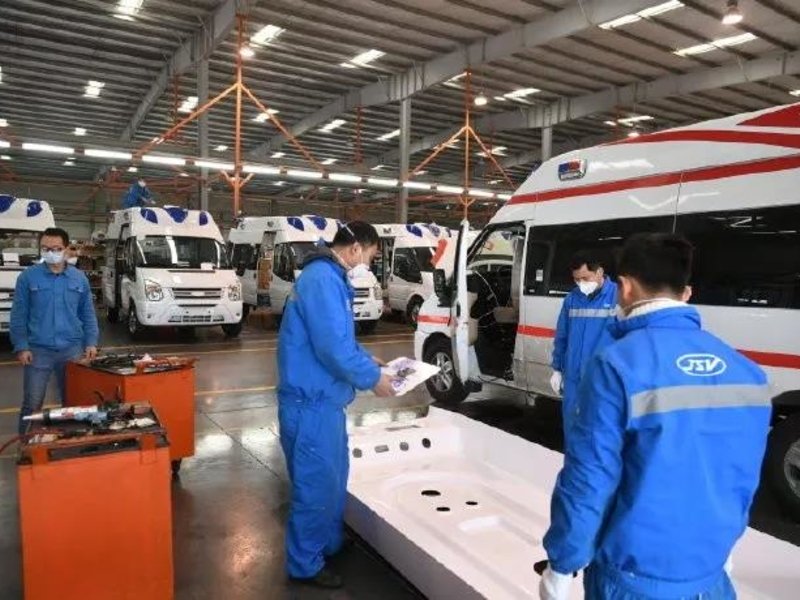
SHANGHAI — Most automakers closed assembly plants in China for the weeklong Lunar New Year holiday but the viral outbreak that has spread across the country, killing 81 people, has prompted many of them to take further steps and precautions to help contain the epidemic.
Ford Motor Co. called back some employees at its truck joint venture, Jiangling Motors Corp., to refit 600 Ford Transit vans into special ambulances for transporting infected patients, according to internet blogs run by Ford’s China unit.
Two state-owned Chinese automakers, SAIC Motor Corp. and Beiqi Foton Motor Co., are also assembling vans to help transfer victims, according to their internet blogs.
The vans will be shipped to central China’s Hubei province and its provincial capital of Wuhan – the epicenter of the viral outbreak.
To contain the new coronavirus, Chinese authorities have banned or limited travel and locked down 17 cities with more than 50 million people.
Daimler, BMW Group, Toyota Motor Corp. and Honda Motor Co. and their Chinese peers such as Dongfeng Motor Group and GAC Motor Co. have donated cash, ranging from 5 million yuan ($720,460) to 26 million yuan to foundations set up to help residents in Hubei and Wuhan fight the disease.
Many dealerships have closed with consumers preferring to stay at home to minimize exposure to the virus that has spread to all regions in China except for Tibet. The death toll is expected to rise, with the number of confirmed cases on Monday rising about 30 percent to more than 2,700.
Dealerships usually remain open during the lunar new year, but industry sales drop because consumers often take a holiday as well.
Analysts believe sales at EV makers such as Tesla and Nio Inc could be vulnerable. About 8 million cars and light trucks were sold last year in the roughly 40 Chinese cities that have 10 or more diagnosed coronavirus cases, or 36.8 percent of total retail volume in the country, Bernstein analysts estimate.
Those cities accounted for 82.5 percent of Tesla’s retail volume, and 68 percent of Nio’s, the Bernstein analysts wrote in a note.
“The latter looks especially vulnerable to a prolonged slump in EV sales,” they said. “We expect EV sales in China to be worse hit than the broader market. Consumer adoption of EVs in China is highly concentrated in the top cities where license plate restrictions and other policies enforce EV purchases.”
Wuhan, a city with 11 million residents, was locked down on January 23. Nissan, Honda and PSA Group are evacuating employees from the Wuhan area.
To control the spread of the viral outbreak, Beijing on Monday extended the Lunar New Year holiday by two days to Feb. 2. In Shanghai, the holiday has been extended to Feb. 8.
The decision by the Shanghai government affects companies such as Tesla Inc., General Motors and Volkswagen, which either own factories or operate them in the city under joint ventures with local partners.
Alibaba Group Holding, Tencent Holdings and other major companies asked employees to work from home for one week after the extended Lunar New Year break ends, seeking to limit the spread of the new flu-like virus.
Many large employers are going one step further, telling staff to work from home until Feb. 7 and not return to offices until Feb. 10.
Auto output and sales are expected to drop because Wuhan and Shanghai are two of China’s major manufacturing and retail hubs. January and February are already some of the weakest months for new-vehicle sales in China because of the lunar holiday.
Wuhan is home to assembly plants for Dongfeng as well as several global automakers, including PSA Group, Renault SA, Nissan, Honda and General Motors. Shanghai is a major production center for SAIC and its joint ventures with GM and Volkswagen Group.
The only thing that remains unknown is how long the epidemic can be controlled to allow businesses in Wuhan to reopen and car shoppers to return to showrooms.